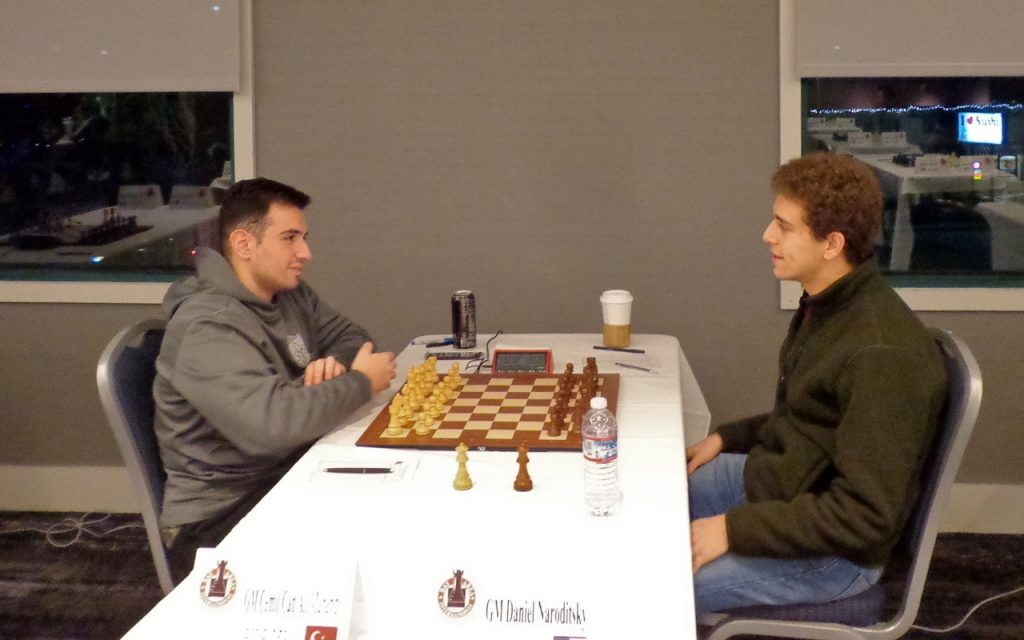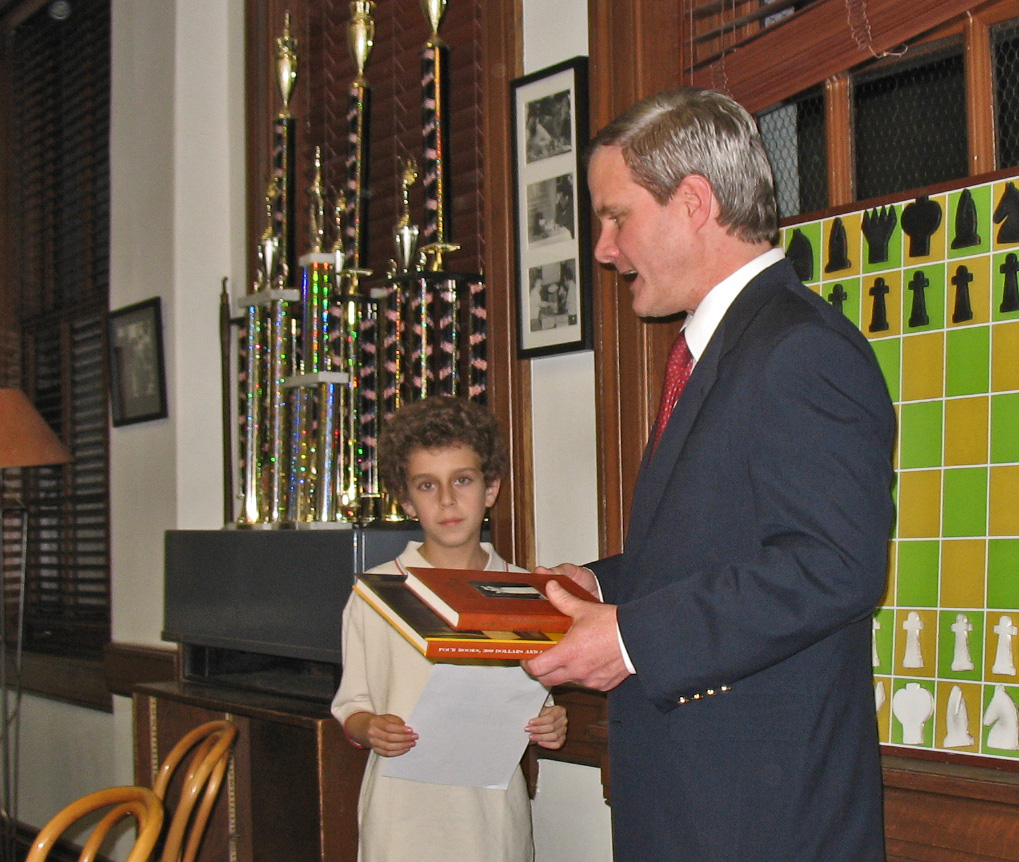
Today’s post is about two players on the San Francisco Mechanics who are both coming to a turning point in any young chess player’s career—or indeed, in the life of anyone in their early twenties: graduation from college. This is the point where they have to decide, am I going to keep on pursuing chess as a professional, or am I going to get a “regular” job or perhaps pursue an advanced degree?
There is no right answer, and the decision will be unique to each individual. Daniel Naroditsky and Yian Liou represent two points on a whole spectrum of possibilities. I hope that their thoughts might benefit other young players who are approaching the same crossroads, and I would welcome some comments from readers!
Of the two, I’ve known Danya better and for longer. I think I first became aware of him at the Far West Open in Reno, in 2005, when he scored a sizzling 5½ out of 6 to win the Class B section. By coincidence, I scored 5½ out of 6 to win the Expert section in the same tournament. Back then, TD Jerry Weikel used to have a little prize ceremony, and I was amused to see this tiny, curly-haired kid stepping up to accept his trophy. Although I was higher-rated than him then, I suspected that my days of superiority were numbered, and I was right.

Danya first made his name known on a worldwide scale in 2007, when he won the world under-12 championship in Turkey. By that time his rating was already above mine, and he has only continued to go up and up, earning his Grandmaster title and continuing to be active in the chess scene even while going to Stanford University.
Danya has been writing about chess since a very young age. His first book, Mastering Positional Chess, came out when he was only 14 years old! Wikipedia says, “He is the youngest published chess author in history,” and while I don’t know any way to verify this claim, I also see no reason to doubt it. I had a very close look at both this book and his next one, Mastering Complex Endgames, before they went to the publisher. I was a stylistic consultant mostly, and Danya even mentions me once or twice in the second book. All of the ideas and all of the examples in these books came from Danya. They grew out of a notebook he had been keeping for himself, on his own initiative, for years. Probably he was already writing that notebook when I first met him as a curly-haired 9-year-old in Reno!
Danya’s chess columns in Chess Life have really been a continuation of Mastering Complex Endgames, and they continue to be full of deep explorations of the kind of endgames that books rarely talk about. He has long since outgrown the need for any sort of “stylistic consultant,” and I can only say that I read his columns with a mixture of awe and pride.
When I caught up with Danya before the PRO Chess League season, I had only two burning questions to ask him: Are you going to try to make it as a chess professional after you graduate from college? And: Are you going to write any more books? His answer to the first question: Very likely yes. “My heart lies in chess,” he said. “Maybe I’m deluded, but I’m still optimistic that I have something to offer the chess world.” Obviously, it won’t be easy. His rating has been about level since he went to Stanford; his high-water mark was 2733 (USCF), when he played in the 2017 U.S. Championship. Obviously one priority is to get back to a level where he can be invited again—but that is not easy, given the constant influx of new, high-rated grandmasters from abroad. You’ve got to improve continually to even keep up.
The answer to my second question was even more exciting: Danya is working on a new book, about his chess philosophy. He offered a couple tantalizing hints of what is going to be in it: “topics that don’t get covered enough in the chess literature, things that grandmasters aren’t straight about.” One possible chapter: Why You Suck at Tactics. Hey, I need that chapter!
International Master Yian Liou is probably much less well-known to most of our readers than Daniel Naroditsky, but he is just about the same age and started playing at the same time. He’s 21 years old and in his senior year at that “other” big university in the Bay Area, the University of California at Berkeley. I interviewed him by e-mail, and I think he gave some unusually frank and detailed answers.
Dana: I’m pretty sure that Michael Aigner was one of your first coaches. What approach did he take, and what did you learn from his coaching? Did you move on to other coaches once your rating got to a high enough level, and have you been satisfied with what you learned from them?
Yian: From what I remember with Aigner, a decent time chunk was spent learning and memorizing new openings with Chess Position Trainer. From him, I got a solid opening repertoire, good intuition of the middlegame (from a positional and tactical perspective) and endgame. All of those components put together are necessary to improve up to 2000 USCF. The synergy of everything he taught is very powerful, and I’m not sure how he came up with it. Afterwards, I did have other coaches, Larry Christiansen and Predrag Trajkovic. Larry focused more on dynamic play and openings, while Predrag focused on strategic play. Overall, I was quite satisfied with what I learned from them.
Dana: Do you plan to become a full-time professional chess player, or do you have other plans such as grad school? If you’re not sure, how are you planning to decide?
Yian: I’ll be going into the tech industry as a software engineer. In the US, going to college would be considered a hedge for people aiming for a professional chess career, but I never got to the level where I had the option of going professional vs. college. Maintaining my chess abilities while attending school at Berkeley has not been too challenging, but advancing in chess is too much of a commitment to balance with a top CS program.
For me, it is very hard to justify going professional in chess. If I was capable of getting to 2650-2700 FIDE, things could have been different. I think chess is very useful for kids in general, but it can also be leveraged to get into a top university. If someone takes a similar route that I did, time spent on chess during college will drop and it’s almost certain that the person won’t go professional. If that person wants to go professional, he or she will know from an early age whether they have the ability and option to do so.
Dana: Was there ever a time when you really thought about being a professional chess player rather than a professional computer scientist? If you think that 2650 is beyond your reach now, do you have any other chess goals that might be more attainable? Sometimes I think that goals can be almost counterproductive – for example, if the goal becomes your reason for playing, and you no longer enjoy the game itself.
Yian: Nope. I never considered becoming a professional chess player as opposed to going into the tech industry. A few years down the line, I will consider going for the GM title, but otherwise I have no other goals. If goals are only marks that indicate a player’s development, then that is fine. More often than not that isn’t the case, and you enjoy the game less, as you mentioned. I encountered such an issue when I was going for my IM title.
Dana: Tell me more about going for the IM title. When did you get your norms? How many tries did it take? When did it, as you stay, stop being enjoyable?
Yian: I got 2 norms in 2012 (North American Open and Metropolitan IM Norm), then my third norm in 2014 in Serbia. The third norm took five tries before I finally got it. Things became less enjoyable while searching for the third norm; in retrospect, a year and a half isn’t that long, but it was not pleasant. After I got the IM title it became easier to enjoy the game.
Dana: What would you think of going after the GM title Larry Kaufman style? You could have a profitable and enjoyable career as a computer scientist, then win the World Senior Championship at age 50 and automatically get the GM title. Of course, that’s a heck of a long time to wait with no guarantee of success…
Yian: Going after the GM title Larry Kaufman style is tempting! Playing some strong opens and getting norms there is an option, too.
Readers, please tell us what you think about the college/career/professional chess tradeoff. What would you do if you had a chance to go either direction? Could the USCF do more to support young people embarking on a chess career? Could corporate America ever be persuaded to hire someone and support him or her as a chess professional, with the understanding that there would be a more regular job waiting for him or her if it didn’t pan out?



{ 1 comment… read it below or add one }
Dana, you must blog about Sam Shankland’s epic blunder at Wijk this year against Giri.